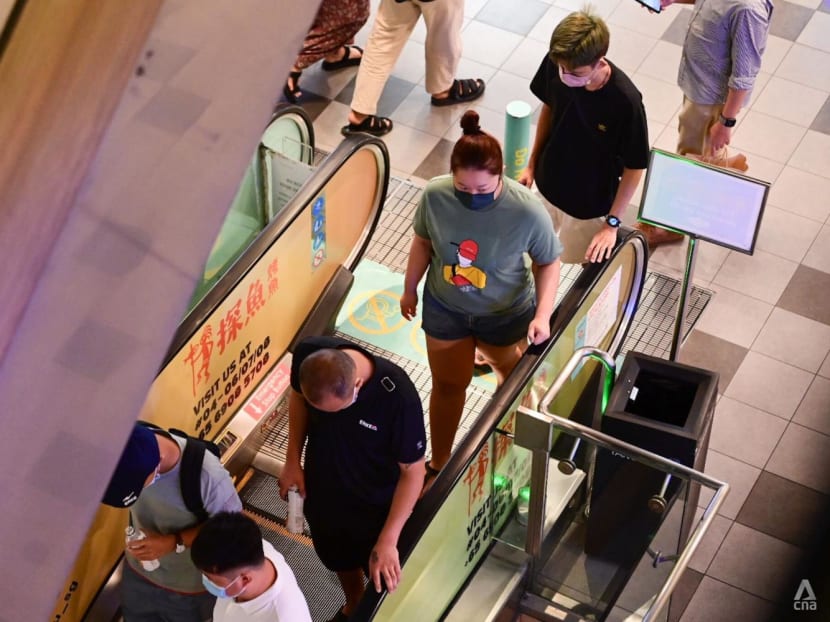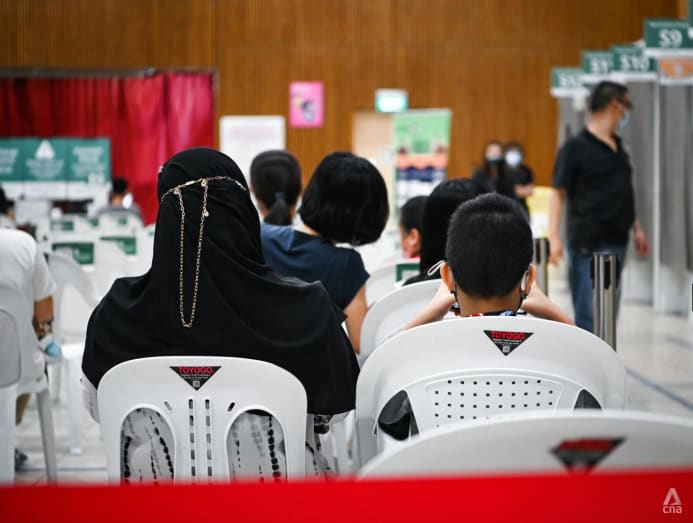Commentary: Mask-wearing now goes beyond just protecting against COVID-19
Almost three years into the pandemic, people have had different encounters with the COVID-19 virus. These cumulative lived experiences shape our risk perceptions and consequently our behaviours and actions, say NUS Institute for the Public Understanding of Risk’s Jared Ng and Yiyun Shou.

Shoppers wearing their masks at Tampines 1 shopping mall on Aug 29, 2022. Singapore earlier announced that wearing a mask will be optional from Aug 29, except on public transport and in healthcare facilities. (Photo: CNA/Gaya Chandramohan)
SINGAPORE: Why have some people kept their masks on, more than two months after they were no longer required almost everywhere in Singapore? What threats and worries continue to plague our minds that we still feel unsafe?
We can point to the 11,732 new COVID-19 infections reported by the Ministry of Health on Tuesday (Oct 12) and the latest XBB Omicron subvariant as signs to remain proactive in fighting the pandemic. Health Minister Ong Ye Kung said earlier that about 15 per cent of cases are in fact reinfections and that a new wave could occur if this reinfection rate climbs to 50 per cent.
However, there is more to understand about our mask-wearing decisions if we look back at our experiences over the last two and a half years of the pandemic. Our experiences have influenced the way we perceive and respond to risks associated with COVID-19 today. This affects – consciously or subconsciously – the mitigation measures we do or do not adopt.
Understanding the risks of a novel coronavirus at the start of the pandemic was not easy. With the threat of COVID-19 hitting our shores looming in January 2020, a multi-ministry task force was set up to manage the pandemic and provide health advisories.
Information was being gathered as the pandemic unfolded and direction was provided based on the best knowledge at the time. Fast forward nearly three years later, our understanding and perception of the disease have changed considerably.
Aside from the effects on physical health, the risk of COVID-19 has become more personalised. Some have lost loved ones while others have had to find alternative sources of income or modes of working. Others were more fortunate and experienced less disruption in their lives.

NOT JUST ABOUT PROTECTING OURSELVES AGAINST COVID-19
There are many reasons we may continue wearing a mask, or even decide to resume it momentarily.
The primary one tends to be that it offers a psychological safety net and some level of actual protection against possible COVID-19 infection. Precautionary measures like mask-wearing make sense in view of a 35 per cent to 50 per cent week-on-week increase in COVID-19 daily cases based on a recent report on Sep 30.
While some may perceive an increasing chance of COVID-19 infection by observing people close to them get infected, some may also perceive the decrease in the severity of the health consequences when they hear that other people only experience mild reactions.Since wearing masks or observing safe distancing have become a voluntary and personal choice in many places, people take it upon themselves to adopt responsive action when visiting malls or crowded spaces.
Besides COVID-19 and its many variants, there are also other respiratory infections that people may wish to protect themselves from, such as the flu or the common cold.
And then there are also the social and moral dimensions. Masking up is a way to protect others such as children (some of whom did not have an available COVID-19 vaccine up until recently), and the elderly. Others may live with family members with underlying medical conditions such as cardiovascular diseases and who are more likely to develop serious illnesses from COVID-19.
Furthermore, mask-wearing is still mandatory on public transport, so some may simply stay masked out of convenience as they commute from one destination to the next.
Many people are also influenced by social norms and tend to conform to the behaviour of others. A study by Yale researchers found that when more people wear masks in public, it creates social norms that encourage even more people to do the same.
TRAITS AND HABITS
How we weigh up and feel about all these potential risks and considerations becomes a question of our risk tolerance.
Those who have lower risk tolerance are more likely to wear a mask and take other precautions against COVID-19. A study conducted in Australia showed that people who were more averse to health risks were more likely to take COVID-19 protective actions despite declining infection numbers.
While some have flung off their masks, others have developed a habit of wearing them after all this while, like how we brush our teeth routinely without perceiving it as an inconvenience. It may be an automatic response to certain contextual cues such as entering a public space. In the short term, these habits may be persistent and not easily changed.
One consideration not at all related to concerns for our health or our risk tolerance? Some online commenters said they simply wanted to clear the many boxes of masks already purchased.
DIFFERENT EXPERIENCES, DIFFERENT PERCEPTIONS
It might be uncomfortable for some who wear masks to walk next to other unmasked strangers, just as those who are mask-free may wonder why some are still so scared to stay masked.
But we should keep in mind that people may have different circumstances. Our personal experiences with COVID-19 affect our tolerance towards the risk and it might help to remind ourselves that not wearing masks could be a reprieve for some, particularly those with breathing difficulties or sensitive skin. We should respect people’s choices when they comply with government advisories.
More than 25,000 cases of the Omicron wave were reported on a single day in February. Today, we are still learning to live with the virus based on our personalised risk, as the situation around us and our loved ones evolve.
But regardless of why we choose so, let us recognise that though our challenges are different, we are facing them together. Tough times may still be on the horizon, let us get through them as a more gracious and united society.
Jared Ng is the Communications Manager at the Institute for the Public Understanding of Risk at NUS. Shou Yiyun is Lead Scientist in the Health and Lifestyle domain at the Institute for the Public Understanding of Risk and Assistant Professor at the Saw Swee Hock School of Public Health at NUS.













